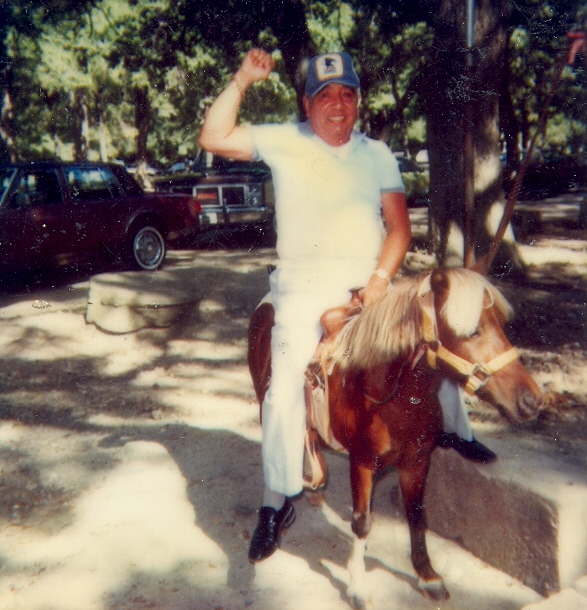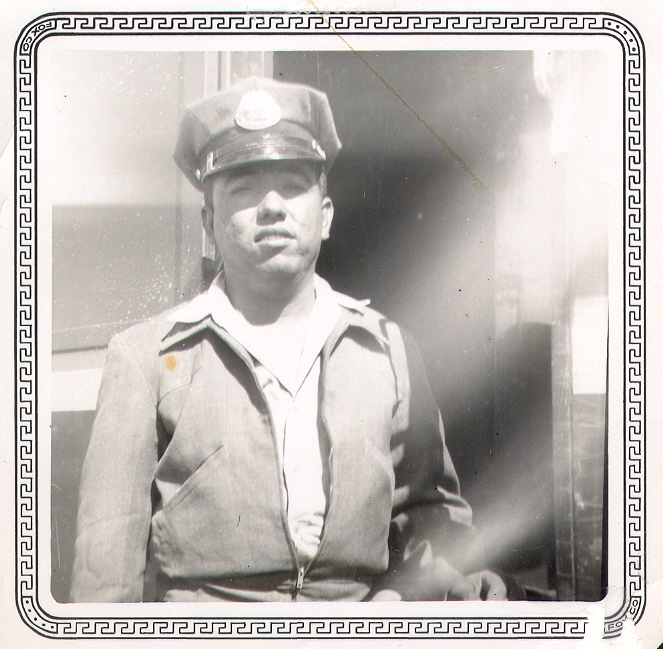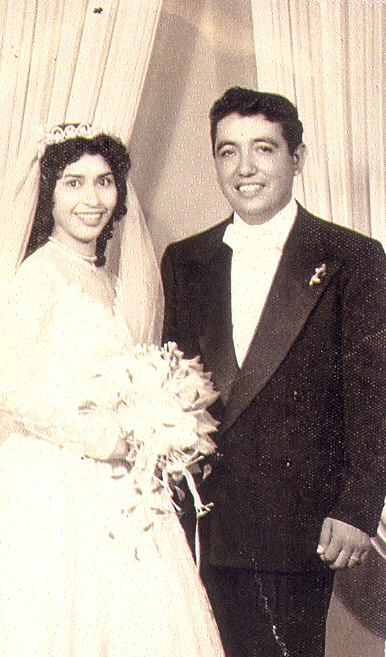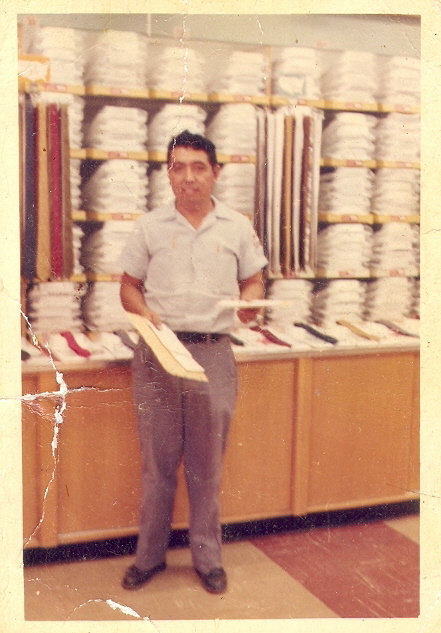Ralph Martinez Jr.


When and where were you born?
San Antonio Texas on January 29, 1927.
Where were your parents from?
They were from San Buenaventura Coahuila Mexico, it’s a little bitty town about eight miles from Montclova which is the seat of the state of Coahuila. It’s the state next to or starts in Eagle Pass, right around there.
Where did you live as a child?
Here in San Antonio
But like streets and side of town?
On the West Side of town,between Brazo’s and San Marcos. And between Commerce and Sanders streets.
Describe to me a typical day in your childhood.
(Laughing) I just would be at home, I got three sisters and I mean when I was little I mean I don’t know I don’t remember, but I mean, after I got older, just was three sisters there and me. There was nothing you could do. I’d take off and go out, and go to the creek and go fishing. Looking for, I would go and dig some worms, go and get some fish hooks, tie them with string and a little piece of twine, I mean twig, and throw the hook out at the creek. I lived about half a block or a block and a half away from the creek from where I used to live. There was a creek there, Alazan creek, I used go fishing. Then we got a little older, we used to jump that creek. Try to jump and see who, and if you didn’t you’d fall in the water and get spanked when you got home! (Both laughing)
How was school life for you as a child?
Hey I liked it! I went to Crocket Elementary; it was about seven or eight blocks away from the house. And at noon, I used to walk to school, and at noon, we used to uuh, I would run home, eat in a hurry and get back so we could play ball (Baseball). I played ball at, at the elementary school for, you know, from the time I started, when I first started playing, I mean I was about ten years old I guess when I first started. And then from then on I kept playing there at the elementary school
What did your parents do?
My mama was a housewife and my dad was a tailor. He was a master tailor,he made good money. I remember we used to go on Saturdays, my mama, my three sisters, and I. We used to go downtown, and my dad used to work upstairs at a tailoring company, and he could see down there, and we’d get off the bus, and he could see, he’d tell us to be there at a certain time, and he could see when we’d come in, and he’d give my mama, he’d sign the check and give it to my mama, and my mama would go and cash it. And then we’d go, grocery shopping and everything and then… he always had money anyway he didn’t need the check! He was always, he was, yeah he was a good domino player and he’d go play dominos and he’d win money. I knew where he used to hang around and I used to go over there and I’d go get my cut from them! Every time he’d win I’d get a little money. So I always had money in my pocket!
What kinds of jobs did you do as a kid?
I hardly ever worked, except I worked at the Nehi bottling company. That’s the one that made Nehi and R.C. cola at the time. I don’t know what they call it now, but I mean Nehi, there’s no more Nehi. They had chocolate, and they had orange, strawberry.
Chocolate Soda!
Chocolate Soda!
Wow!
And it was good! (Laughing)
How much did you make back then? What could a dollar get you?
A dollar could get you a lot! (Laughing) That was a lot of money! I used to make about $4.50 to $5.00 a week. A dollar, man I mean with a quarter you could go… we used to walk downtown, which wasn’t to far from the house, twelve blocks I guess. And my sister and I used to walk, and five cents to get into the movie, five cents to get candy, and then five cents for a hamburger, and five cents for a soda. For twenty five cents you could have the whole day!(Laughing)
Gosh!
Hamburgers at a nickel, now you can’t even get them for a dollar! (Laughing) Ninety nine cents I think it would be, but with tax. And there was no tax then.
When you graduate high school, what did you do afterwards?
I graduated at mid-term and joined the navy. I was in the navy right after I graduated. Two days later I was on the way, on my way to boot camp.
As soon as you graduated, and you graduated mid-term?
Mid-term, I didn’t get my diploma because I thought I would be back and get it with my class, but I got back in March from boot camp, and then I had to go back, my class graduated in May, so I got my diploma through the mail.

What did you do in the service?
I was a radio operator, sending and receiving code. I went to radio school, and man it was rough, cause I mean, I got a pretty good grade cause I could, I mean they give you a test for different things and I liked radio, that code, I could hear it good.
You’re talking about Morse code right.
Morse code, yeah. And we used to have to write it down with a pencil, and I wasn’t to fast with a pencil, but see in junior school, I didn’t take any typing in high school, but in junior school I took one semester of typing so I knew my keys and I could type pretty good, I mean I used to practice with it, and so when, when the code got a little faster. They gave us, we were going to classes to learn code, and also going to classes to type. And since I knew the keys and knew how to type a little, and I’d practice and I ‘d practice. And when they sent us to take the code with a typewriter, I was good, I mean I was pretty darn good!
Blazing!
Then I graduated, I graduated I think it was eighth or ninth in a class I think of ninety two.
That’s good!
So I got assigned, I got a good assignment, and that’s, that’s it.
That’s the service? So how long were you there?
Two years!
Two years?
Yeah.
Two years, and that was in World War Two?
World War Two.
So you fought World War Two for two years?
Yeah, well I didn’t fight, I mean hey I was sending and receiving, I wasn’t fighting,
So after world war two, what did you do here in San Antonio?
Well I worked at the Express publishing company, part time because I couldn’t get a job, then I worked for Southern Equipment Company, which is a company that was down town. They had different things, they had, on the first floor they had automotive parts, they sold automotive deal. And they had a part which they sold parts for a washing machine, and stoves and all that. But I worked on the second floor, as a Columbia Records distributor for all of south Texas. And I used to unload, uh the cartons of records.
Vinyl records?
Vinyl records, the big ones, they used to come in boxes of a hundred. I used to unload them, and separate them, and then like some of those big name orchestras, well they would sell and we would send them out by the, by the hundreds, or by twenty fives or whatever. And we used to send them to different record companies. I mean, you know, where they sell retail records. At different places, at the time there was a whole bunch of them here in San Antonio. And then we’d ship them down south to McAllen, Brownsville, Corpus.
Did you always just want to go to the service, or did you want to go to college?
Well I wanted to go to college but I wanted to go to the service first, then go to college. Maybe get some G.I. bill so they could pay for my college, but I never made it.
You never made it to college?
I went for one semester, and I had to drop out because my mom and dad got sick.
Here in San Antonio did you ever have to face any kind of discrimination, and how bad was it?
It was pretty bad, I went to this place, where I was going with this girl and her half sister they lived in the same house. Her half sister had a boyfriend from Beeville Texas, at a navel base close by, and he came down here and went out with that sister, and I took out the other sister, and we went to this place across from the state hospital on Presa Street. We drove in, and went and parked, and went and sat down. It was like a open air café. And we sat there, and nobody would wait on us, finally I asked one of the waitresses, and she came over and said, “We don’t serve Mexicans here!” So we had too, we just left and I had just gotten out of the service. It was sorry I mean you know, bad!
What was a night out on the town like? How did you have fun back then?
When? After I got out of the service?
Well you know, Yeah after you got out the service, when you were a young adult, I’m talking early twenties.
I belonged to about four different clubs; before I got married I belonged to about four different clubs. And we used to have dances all the time. Every Saturday one club, or the other, or the other, we’d have dances. And we’d just go and dance, then you’d take off and go, go get something to eat. But that was right around that time when I was working for the post office. I had a car so sometimes we’d double date, and some times I’d date by myself. And we’d take off and take the girl home but we tried to get her home early. Or else they wouldn’t let you go out with her again! Parents were a little rough then

When did you start working for the post office?
February 1, 1949.
How old were you?
I was twenty two.
How was that? How was working for the post office?
Well, I took an exam in July of 48, and I made a ninety two on it, but uh, they were hiring, but they weren’t hiring too fast, and I got called, and I went and started on the first of February as a temporary indefinite substitute, which means I, they could fire me at any time. I had to go in for six months probation, and I got my probation easily, six months later on the first of September I was a, they called it a regular substitute. They couldn’t fire me then anymore, unless I fouled up. Then I put in thirty eight years and four months all together!

If you could choose to grow up in our time would you? Or was life back then that much better?
I think it was better then, I mean now there’s too many, too much junk going on, drugs, drinking, and all that. We had a good time, and we didn’t use drugs, we didn’t have… We’d get into fights, ok but you’d fight, then you’d shake hands, and that was it. I mean hey you were still friends, I mean you know, even if you weren’t friends, you didn’t go and shoot somebody just because he knocked the heck out of you. I got the heck beat out of me quite a few times. With three sisters, forget it! They used to insult my sisters, you know, and I would get into fights. I got bum hands, bum nose. (Laughing)
I can see where we get it from! Is there anything else you would like to add to this interview?
Nah, I mean except that I think times were a lot better then. You didn’t need to much money, you didn’t need hardly anything. I mean with a car, gas was a heck of a lot cheaper.
Ohh I have to ask you, I have to ask you, so I can just kill myself later, how much was gas back then?
Ooh, heck it was about twenty five cents a gallon. Or something?
(Laughing) Ohh No!
Maybe even less I don’t remember. But it was, I mean it was cheap, I remember I used to go to this place, I used to go drink beer there, and I used to play ball for the place. We used go in there, and no problems no nothing, everyone would say hello, beer was two for a quarter! It was great, I mean hey everything was cheap, everything was great.
That sounds great!
No problems, no nothing!
The world wasn’t moving in fast forward.
Ohh no, not uh, not at all!
Examples of Internet annotated sites:
The Handbook of Texas Online. Copyright © The Texas State Historical Association. The Handbook of Texas Online is a multidisciplinary encyclopedia of Texas history, geography, and culture sponsored by the Texas State Historical Association and the General Libraries at University of Texas at Austin. http://www.tsha.utexas.edu/handbook/online/ Last Updated: May 16, 2005.
AIER Cost-of-Living Calculator. The calculator uses the Consumer Price Index to do the conversions. The source for the data is the Bureau of Labor Statistics. The calculator converts the cost of items in American dollars from 1913 to the present. Organized in 1933 as a private, independent, scientific, and educational charitable organization, the American Institute for Economic Research plans its research to help individuals protect their personal interests and those of the Nation. American Institute for Economic Research (AIER), P.O. Box 1000, Great Barrington, Mass 01230. http://www.aier.org/colcalc.html. (2005).